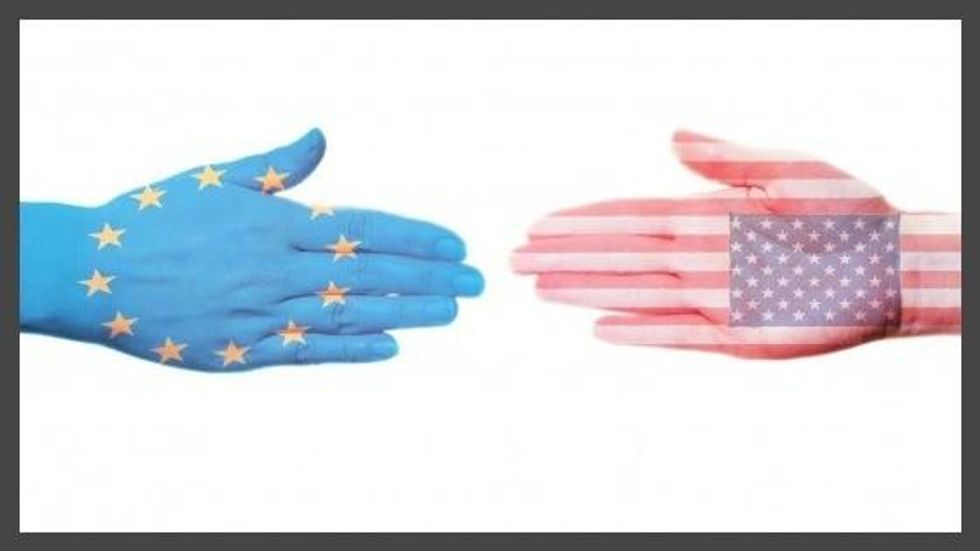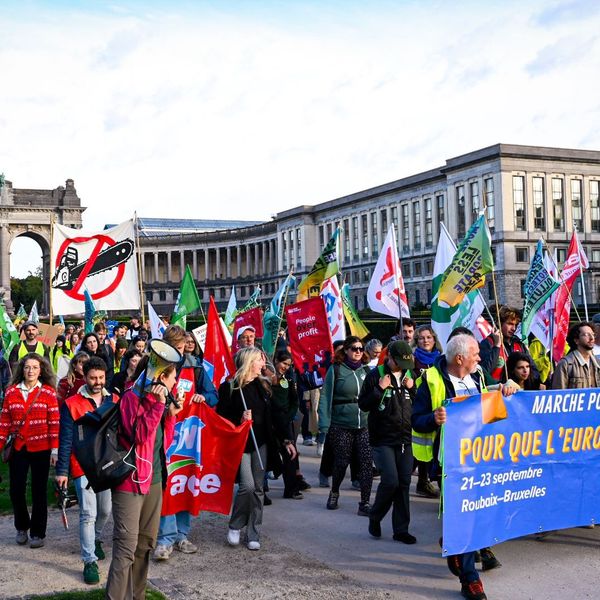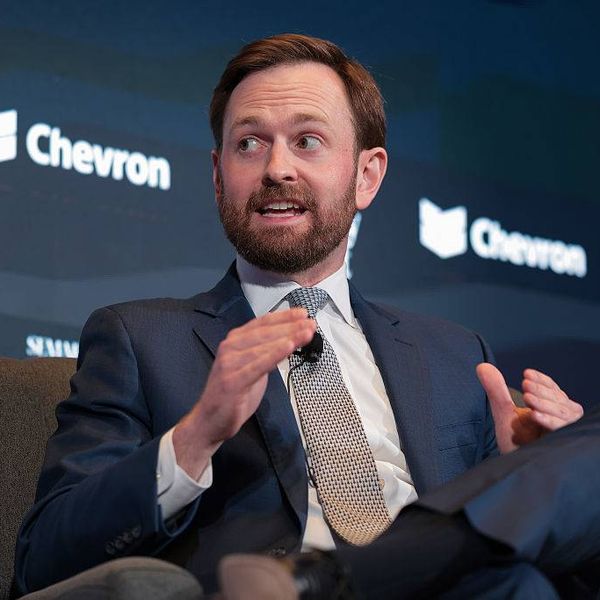Corporate Lobby Machine Takes Aim at US/EU Trade Deal
A Trans Atlantic "free trade" agreement could unleash next wave of corporate assault on global democracy

As the New York Times reports Friday, the prospect of a new trade pact between the US and European nations -- though worrying to fair trade supporters, labor unions, and social justice advocates of all stripes--has the world's most powerful corporations drooling at the mouth.
According to the Times:
Yum Brands, the owner of KFC, wants cheaper chicken wings, rumps and other assorted poultry parts.
Ocean Spray wants an easing of pesticide regulations.
DuPont wants greater protection of trade secrets.
Negotiations have barely begun for a potentially sweeping trade pact between the United States and Europe. But the lobbying is already well under way by corporations on both sides of the Atlantic. And the sometimes parochial nature of their demands is sure to further complicate the trade talks, which no one expects to proceed quickly or smoothly, given the geopolitics involved.
And what are the "geopolitics involved"?
Like "free trade areas" conceived of in the past, the implication of a transatlantic agreement spells out a situation in which the demands of corporate interests supersede those of the people who exist within the countries that participate.
And because the agreements are historically drafted in secret and then rushed through by governments with little chance for review by voters or citizens, they have become--charge critics--the best vehicle for corporations to sidestep regulations (which profit-hungry companies term "hindrances to business" or "trade irritants") that are designed to protect workers rights, the environment, and the common good.
But, according to Lori Wallach who heads Public Citizen's TradeWatch, what corporations "consider trade irritants, we consider the most important consumer, health, environmental, privacy, financial stability safeguards on either side of the Atlantic."
Trade agreements like this, she told the Times, are simply "an effort to achieve through trade what that they could not achieve through democratic processes domestically."
In just one telling example cited by Times, juice giant Oceanspray, amid concerns that Europe's restrictions on pesticide use--which are much tougher than those in the U.S.--is hoping that the binding language of the trade deal would allow it to unburden itself from tariffs or prohibitions against import of its cranberries or other fruit to European nations that current exist.
Critics of FTA's call this neoliberal globalization's "race to the bottom" in which corporations bully national governments to erase consumer, worker and environmental protections in order to maximize profits.
As the Times explains: "...companies see the talks as an opportunity to pick and choose the most favorable regulations among the varying rules on either side of the Atlantic -- whether in food, pharmaceuticals or farming."
With negotiations on the deal still early on, it is easy to see that corporations are putting their lobbying machine in full gear. What remains to be seen is whether or not the forces opposed to these deals--on both sides of the Atlantic--are sufficiently prepared to fight back.
_______________________________________________
An Urgent Message From Our Co-Founder
Dear Common Dreams reader, The U.S. is on a fast track to authoritarianism like nothing I've ever seen. Meanwhile, corporate news outlets are utterly capitulating to Trump, twisting their coverage to avoid drawing his ire while lining up to stuff cash in his pockets. That's why I believe that Common Dreams is doing the best and most consequential reporting that we've ever done. Our small but mighty team is a progressive reporting powerhouse, covering the news every day that the corporate media never will. Our mission has always been simple: To inform. To inspire. And to ignite change for the common good. Now here's the key piece that I want all our readers to understand: None of this would be possible without your financial support. That's not just some fundraising cliche. It's the absolute and literal truth. We don't accept corporate advertising and never will. We don't have a paywall because we don't think people should be blocked from critical news based on their ability to pay. Everything we do is funded by the donations of readers like you. Will you donate now to help power the nonprofit, independent reporting of Common Dreams? Thank you for being a vital member of our community. Together, we can keep independent journalism alive when it’s needed most. - Craig Brown, Co-founder |

As the New York Times reports Friday, the prospect of a new trade pact between the US and European nations -- though worrying to fair trade supporters, labor unions, and social justice advocates of all stripes--has the world's most powerful corporations drooling at the mouth.
According to the Times:
Yum Brands, the owner of KFC, wants cheaper chicken wings, rumps and other assorted poultry parts.
Ocean Spray wants an easing of pesticide regulations.
DuPont wants greater protection of trade secrets.
Negotiations have barely begun for a potentially sweeping trade pact between the United States and Europe. But the lobbying is already well under way by corporations on both sides of the Atlantic. And the sometimes parochial nature of their demands is sure to further complicate the trade talks, which no one expects to proceed quickly or smoothly, given the geopolitics involved.
And what are the "geopolitics involved"?
Like "free trade areas" conceived of in the past, the implication of a transatlantic agreement spells out a situation in which the demands of corporate interests supersede those of the people who exist within the countries that participate.
And because the agreements are historically drafted in secret and then rushed through by governments with little chance for review by voters or citizens, they have become--charge critics--the best vehicle for corporations to sidestep regulations (which profit-hungry companies term "hindrances to business" or "trade irritants") that are designed to protect workers rights, the environment, and the common good.
But, according to Lori Wallach who heads Public Citizen's TradeWatch, what corporations "consider trade irritants, we consider the most important consumer, health, environmental, privacy, financial stability safeguards on either side of the Atlantic."
Trade agreements like this, she told the Times, are simply "an effort to achieve through trade what that they could not achieve through democratic processes domestically."
In just one telling example cited by Times, juice giant Oceanspray, amid concerns that Europe's restrictions on pesticide use--which are much tougher than those in the U.S.--is hoping that the binding language of the trade deal would allow it to unburden itself from tariffs or prohibitions against import of its cranberries or other fruit to European nations that current exist.
Critics of FTA's call this neoliberal globalization's "race to the bottom" in which corporations bully national governments to erase consumer, worker and environmental protections in order to maximize profits.
As the Times explains: "...companies see the talks as an opportunity to pick and choose the most favorable regulations among the varying rules on either side of the Atlantic -- whether in food, pharmaceuticals or farming."
With negotiations on the deal still early on, it is easy to see that corporations are putting their lobbying machine in full gear. What remains to be seen is whether or not the forces opposed to these deals--on both sides of the Atlantic--are sufficiently prepared to fight back.
_______________________________________________

As the New York Times reports Friday, the prospect of a new trade pact between the US and European nations -- though worrying to fair trade supporters, labor unions, and social justice advocates of all stripes--has the world's most powerful corporations drooling at the mouth.
According to the Times:
Yum Brands, the owner of KFC, wants cheaper chicken wings, rumps and other assorted poultry parts.
Ocean Spray wants an easing of pesticide regulations.
DuPont wants greater protection of trade secrets.
Negotiations have barely begun for a potentially sweeping trade pact between the United States and Europe. But the lobbying is already well under way by corporations on both sides of the Atlantic. And the sometimes parochial nature of their demands is sure to further complicate the trade talks, which no one expects to proceed quickly or smoothly, given the geopolitics involved.
And what are the "geopolitics involved"?
Like "free trade areas" conceived of in the past, the implication of a transatlantic agreement spells out a situation in which the demands of corporate interests supersede those of the people who exist within the countries that participate.
And because the agreements are historically drafted in secret and then rushed through by governments with little chance for review by voters or citizens, they have become--charge critics--the best vehicle for corporations to sidestep regulations (which profit-hungry companies term "hindrances to business" or "trade irritants") that are designed to protect workers rights, the environment, and the common good.
But, according to Lori Wallach who heads Public Citizen's TradeWatch, what corporations "consider trade irritants, we consider the most important consumer, health, environmental, privacy, financial stability safeguards on either side of the Atlantic."
Trade agreements like this, she told the Times, are simply "an effort to achieve through trade what that they could not achieve through democratic processes domestically."
In just one telling example cited by Times, juice giant Oceanspray, amid concerns that Europe's restrictions on pesticide use--which are much tougher than those in the U.S.--is hoping that the binding language of the trade deal would allow it to unburden itself from tariffs or prohibitions against import of its cranberries or other fruit to European nations that current exist.
Critics of FTA's call this neoliberal globalization's "race to the bottom" in which corporations bully national governments to erase consumer, worker and environmental protections in order to maximize profits.
As the Times explains: "...companies see the talks as an opportunity to pick and choose the most favorable regulations among the varying rules on either side of the Atlantic -- whether in food, pharmaceuticals or farming."
With negotiations on the deal still early on, it is easy to see that corporations are putting their lobbying machine in full gear. What remains to be seen is whether or not the forces opposed to these deals--on both sides of the Atlantic--are sufficiently prepared to fight back.
_______________________________________________

